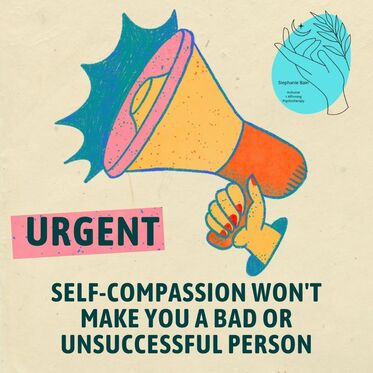If I got a dollar every time someone told me they need to continue to be harsh and critical to themselves...
Self compassion helps individuals to be kind and understanding towards themselves when they are experiencing difficult thoughts, emotions, and experience. This can lead to a reduction in negative self-criticism and an increase in positive self-regard. Research has shown that self-compassion is associated with lower levels of depression, anxiety, and stress, as well as increased well-being, happiness and life satisfaction. Here's a Stanford study. Self-compassion can be a key part of healing complex trauma (or c-ptsd). Self-compassion can INCREASE accountability by helping people recognize and acknowledge their mistakes and shortcomings without becoming overwhelmed by feelings of self-criticism and shame. When individuals are self-compassionate, they are able to view their mistakes and failures as part of the human experience, rather than as a reflection of their personal worth. This allows them to take responsibility for their actions without becoming overly self-critical. Self-compassion can also help individuals to learn from their mistakes by encouraging them to be honest with themselves about what went wrong, without becoming paralyzed by self-doubt or fear of failure. By taking this approach, self-compassion can help individuals to develop a more resilient and growth-oriented mindset, which can lead to better problem-solving skills and improved decision-making. More on that. Self-compassion will not make someone less productive because it actually promotes a sense of motivation and engagement. Self-compassion allows individuals to understand their mistakes and shortcomings without feeling overwhelmed by self-criticism and shame, which can lead to feelings of hopelessness and demotivation. Instead, self-compassion provides a sense of emotional support, which helps individuals to be more resilient and persistent in their efforts to achieve their goals. Additionally, self-compassion promotes a growth mindset, which encourages individuals to focus on the process of learning and self-improvement, rather than the outcome. This can lead to a more positive and proactive approach to problem-solving, which can ultimately increase productivity. Self-compassion also allows individuals to take a balanced view of their performance, which can help them to maintain a healthy work-life balance and avoid burnout. By being kinder to oneself, individuals are less likely to experience feelings of stress, anxiety and depression, which can negatively impact productivity. Instead, self-compassion can lead to better mental and physical well-being, which can enhance overall productivity and effectiveness. An exercise to start thinking more compassionately.
self-compassion
0 Comments
Leave a Reply. |
AuthorStephanie Bain, LMFT Archives
April 2024
Categories
All
***Resources are not a substitute for therapy and are not intended for making diagnoses or providing treatment. Not all practices and tools are suitable for every person. Please discuss exercises, practices, and tools with your individual therapist or health care provider.
|






 RSS Feed
RSS Feed